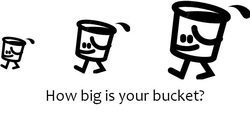
Joy is food for our self-healing abilities; it is the fuel for our learning abilities. Joy is what gives us resilience. If we lose track of the joy in our lives, then it becomes harder to heal from everyday living. We need joy to recover from traumatic events. Recent research by the HeartMath Institute has shown that while meditating can help us feel more calm and safe, feelings of joy and delight are what make it possible to heal and renew.
One of the most important conversations I have with my clients is about resources. I use the word resources to refer to the people, places and things that nourish or foster joy. I ask them “Where do you find joy in your day?” Some people can access joy easily. They know where their joy is and can access it well. Others sit quietly and slowly realize that it has been a while since they have felt joy. Maybe it has been so long they aren’t sure where to find it. In the movie “City Slickers” Billy Crystal’s wife tells him to “Go find your smile” when he appears to have lost track of his joy. Other people respond too quickly: they assume their joy is in the same places they have always been, or maybe where they think they should be, but is that really where they find joy today?
My resources can be my husband (sometimes), my kids (sometimes), my dog (almost always), my cats (almost always), and quilting (usually). But small animals, babies, beautiful sunsets, and watching bugs pollinate my garden always bring me joy and delight. These are my personal sources of the joy found in delight.
We also need social resources. The feeling of being in a supportive community, part of a clan, or a contributing member of a team can provide a profound sense of the joy felt in satisfaction. We can play as we dance, sing, cook and eat together.
Health care providers become a social resource for the client. As I begin a treatment, my hope is that my caring demeanor and loving hands allow the client to feel safe, creating the opportunity for their body to settle deeply long enough to allow them to access their joy.
I use the example of a bucket when I talk about replenishing our body’s resources. We all have a bucket that represents our capacity for handling the difficulties/stresses/traumas that come our way. Some people have small buckets and some people have large buckets and most of us are somewhere in between.
Costly feelings, such as anger, disdain and sadness, deplete the resources in our bucket, they activate our sense of “not safe” and cause our body to fight, flee or freeze. They are not “bad” feelings. Indeed, they are necessary for our full participation in life, but they do cost us resources to experience them.
Neutral feelings don’t change the resources in our bucket. We feel safe in the moment, calm, peaceful and meditative. While I would hypothesize that, if we experience neutral feelings as a discipline over time (like a meditation practice) then that discipline can make our bucket slightly larger and sturdier, according to HeartMath neutral feelings don’t replenish our resources. They also don’t use them up. We could say that neutral feelings prepare the way for joy.
Replenishing feelings like joy, delight, happiness and gratitude refill the bucket. They allow our autonomic nervous system to reset to levels that allow healing and repair activities to function efficiently.
When we are looking at another person, it is important to see them as a whole. If all we notice are the parts that aren’t working well, then we are missing the vast majority of the person: the parts that work perfectly 24/7 like a well-tuned machine. Holding this wellness in our awareness, while noticing the parts that might need some assistance, is a way of acknowledging the person’s resources. Instead of asking “How can I fix you?” We might ask, “How can I be present with you in your experience in a way that allows your healthy parts to give resources to the parts that are feeling overwhelmed?” This does not mean that we only allow “good” feelings, it means we are there to be a resource for the person as they process the difficult feelings. They can feel the joy of being cared for as they also feel sadness or grief or disappointment.
Maintaining a broad perspective allows us to see more than a small piece of the person. When we allow ourselves to see the whole person (not just the part with a complaint or a part we find lacking) we gain access to resources that are nurturing to the whole person. When we see the whole person we tap into compassion and the joy of connection, allowing us both to deepen into greater well-being, refilling the bucket.



 RSS Feed
RSS Feed